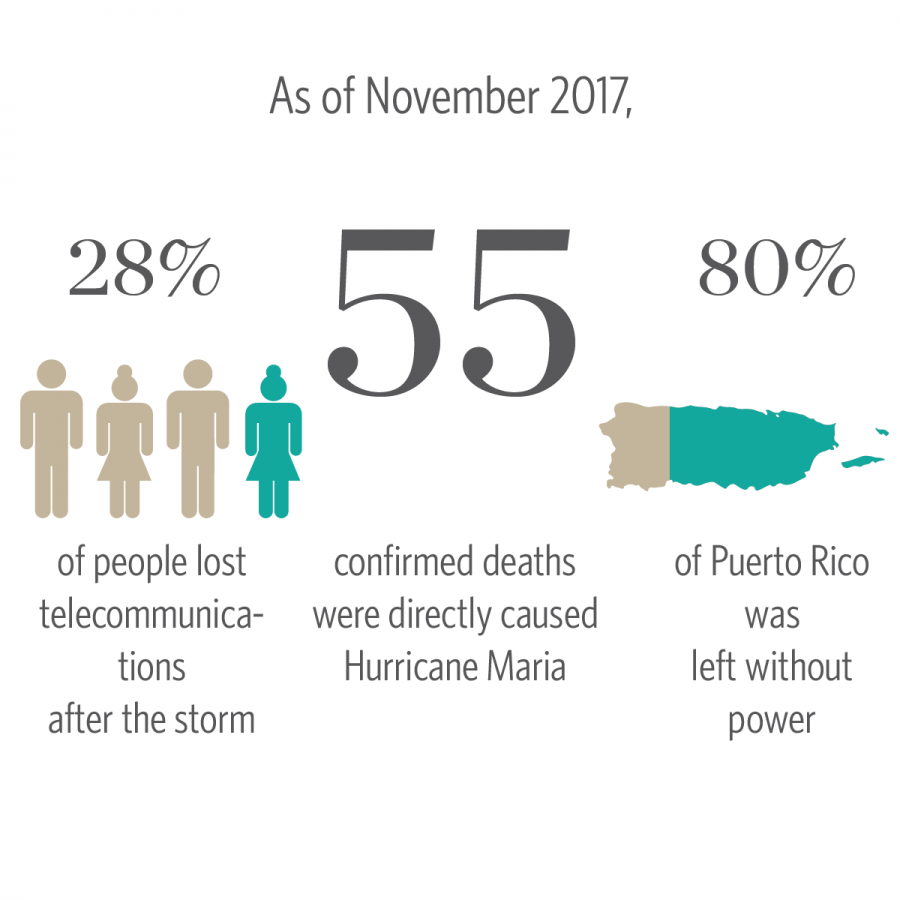University librarian helps Puerto Rico preserve books
Source: Kaiser Family Foundation
January 18, 2018
Even though Hurricane Maria hit only four months ago, University library worker Miriam Centeno is already preparing for the next natural disaster.
Centeno is the collections care coordinator for the University library, and traveled to Puerto Rico two weeks ago to assist with the preservation of books and libraries in the event of future natural disasters.
According to The Kaiser Family Foundation, the hurricane is known to have killed 55 people, though the total number is thought to be higher. KFF concluded that the hurricane worsened the public health and economic issues that Puerto Rico was already facing.
However, the issues that Centeno focuses on are Puerto Rico’s libraries and the culture.
Centeno’s knowledge and experience of book preservation made her qualified for teaching preservation, said Jessica Unger, emergency programs coordinator for the American Institute for Conservation (AIC).
Get The Daily Illini in your inbox!
“I take care of books, and I take care of the environment in which they are stored,” Centeno said.
Centeno worked with the National Heritage Responders, which is a part of AIC. Unger said that Centeno was extremely helpful to work with, not only because of her work experience, but because she knew the area.
“Her local knowledge of the landscape there was tremendously helpful,” Unger said.
As a Puerto Rican native, Centeno was first concerned for her family, who lives there now, when Hurricane Maria hit. Two weeks after the storm, the University of Puerto Rico at Mayaguez contacted her for assistance.
“(The University of Puerto Rico) had been hit by Maria, but had not been (as) devastated as the rest of the island or some other places in the island,” Centeno said. “They had some damage but they also had the ability (to communicate) outside of the island.”
Centeno went to various spots across the island and gave speeches about preservation and preparedness for the next hurricane season.
“If we don’t start now to prepare for the next (hurricane) season, we are at great risk,” she said. “We wanted to make sure that the future librarians and activists will be able to be better prepared in the future when they are taking care of the collections on the island,” Centeno said.
Books are one of the few accessible ways people can share their heritage with one another, which is why preservation is so important to her, she said. Unger agreed and said that books and libraries are a sign of normalcy, which is key to culture and recovery from a disaster.
“It’s helpful for people to have that sense of continuity in their culture to get information,” Unger said.
As Centeno’s parents were driving with her through their town in Puerto Rico, she said she saw a museum that was protected by only a tarp. She said she saw some libraries that were infested with mold and were inaccessible due to dangerous conditions inside.
“We have lots and lots of institutions in that status right now, where we really have to act now,” she said.
She was able to introduce Personal Protection Equipment, such as aprons, face masks and gloves, to library recovery workers to help minimize exposure to mold when going inside. She also introduced the Preservation Self-Assessment Program (PSAP), which allowed institutions and libraries to go through their inventory and find out what they lost and what they can possibly recover.
Centeno wasn’t able to reach the east side of the island, which Maria hit the hardest. This worries her because although KFF said most of the island’s power has been restored, it is usually spotty, making it hard to have access to PSAP.
“I need to give people the basis of preservation so they understand what they need to be able to do in order to take care of their collection, so they understand what they need to do to prepare for a disaster,” she said. “We were trying to impact as many people as possible.”







